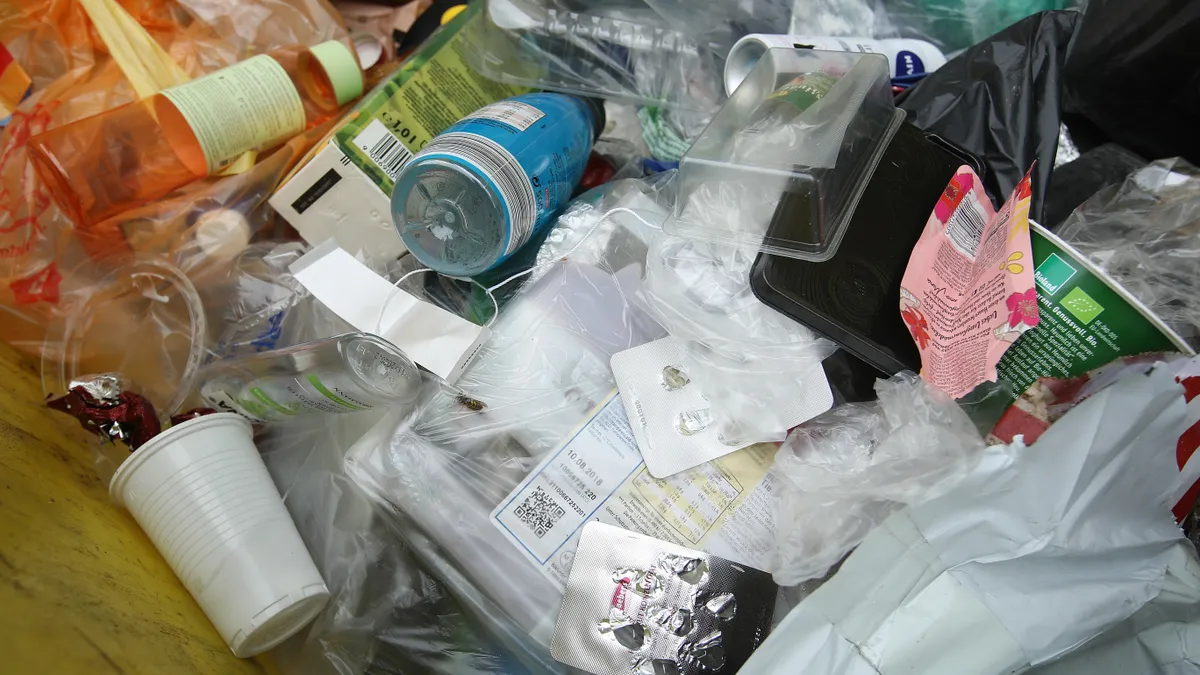Dive Brief:
- The Northeast Recycling Council and the Northeast Waste Management Officials’ Association have published model legislation for minimum postconsumer recycled content in plastic products and packaging.
- The model calls for requiring producers of many types of products and packaging, such as food containers and beverage bottles, to ramp up postconsumer recycled content over time. It also calls for states to coordinate on implementation if they pass similar bills.
- NERC and NEWMOA see the document as a helpful tool for legislators interested in introducing postconsumer content bills, but the groups say recycled content mandates alone are not enough to bolster the recycled plastic market. Other initiatives to improve the quantity and quality of recyclables collected should support such bills, they said.
Dive Insight:
Major brands continue to make commitments to use more recycled content in their products, and several states have recently adopted laws aimed at ramping up postconsumer resin in plastic products and packaging. New Jersey signed an ambitious recycled content bill into law in January, with Washington and California among other recent adopters.
Terri Goldberg, NEWMOA’s executive director, said the associations wanted to zero in on a recycled content model because it’s an opportunity to harmonize the Northeastern states around a policy that is already gaining traction.
“There’s a strong awareness that we have regional markets for these materials and that companies would much prefer to be dealing with a group of states that have very similar approaches rather than trying to navigate in a whole bunch of different states with different approaches,” she said.
The model bill also encourages states to collaborate on similar recycled content bills, which could particularly benefit smaller states, said Lynn Rubinstein, executive director of NERC. “A state with the population of Vermont or New Hampshire or Maine may not get manufacturers to react on their own. They're small enough that a brand could simply say they won’t sell [items with plastic packaging] there.”
State recycling officials and members of NERC and NEWMOA spent about two years creating the model legislation and soliciting feedback from recycling organizations and other experts.
The model recommends guidelines for minimum postconsumer content in film bags; containers for food, beverages, personal care and household cleaning products; and rigid plastic containers.
It recommends setting a 20% minimum recycled content standard for film bags six months after a bill’s enactment, rising to 40% a year after enactment. The recommended minimum recycled content level for single-use containers is 15% two years after enactment, rising to 25% within five years of enactment. Durable products with a lifespan longer than three years would have a 25% minimum recycled content requirement standard after six months and 75% after 10 years.
It also calls for producers to provide third‐party certification of the minimum postconsumer recycled content levels in products sold into the state. Rubinstein said that element was controversial for some stakeholders because the process can be expensive and complex.
The model bill’s working group took advice and inspiration from recycled content bills already on the books. The bill’s penalty language is from Washington’s recent bill, for example.
The group was still working on the draft model when New Jersey signed its own law, which in 2024 will require rigid plastic containers to contain at least 10% postconsumer recycled content and plastic beverage containers to contain at least 15%. Material definitions from that bill are in the model legislation.
Both Goldberg and Rubinstein said they’ve received positive and negative feedback about the resulting model bill, which they expected because each state that has passed a minimum content law has done it slightly differently.
Underlying tensions about whether enough postconsumer resin is available to meet brand demands — and whether enough recycled material is being collected to support those markets — was also a hurdle in crafting the model legislation, Rubinstein said.
“It’s a challenge, because the amount of material that would be required to meet these proposed percentages is not available yet. It's just not being collected,” she said.
NERC and NEWMOA will not lobby for the model legislation because they are both nonprofits and because they expect states to go through their own detailed bill processes.
“This is not a done deal, and it’s not something that's going to be passed as-is. It’s just a starting point,” Rubinstein said.











